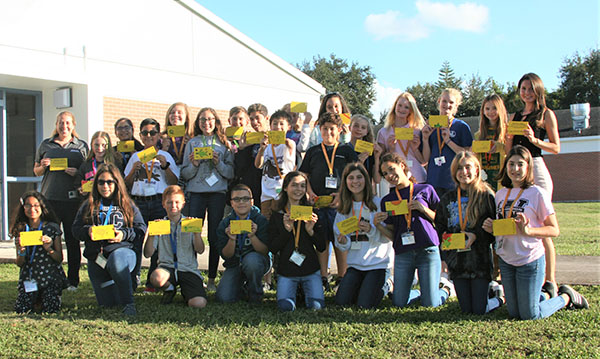
Students at Wellington Landings Middle School have the opportunity to join some unique after-school clubs, and one that provides hands-on learning combined with participation in real science is the Marine Conservation Club, sponsored by seventh grade civics teacher Mary Jackson.
“I started the club five years ago, and the whole reason is because I’m an avid free diver as well as a scuba diver, and I love to teach. It grew from teaching civics to go into marine biology because of my passion for the ocean,” Jackson said. “We didn’t have a Marine Conservation Club, and I was vice president of my club back in high school, so I wanted to start one here.”
Presently about 50 students are active members, and at their most recent meeting on Wednesday, Oct. 30, they heard a presentation by Dr. Amanda Waite of the ANGARI Foundation.
Waite educated the students on the Lagoon Drift program, a Lake Worth Lagoon drift card study that first took place in November 2017. The program uses the carefully scheduled release of environmentally friendly placards into predetermined locations so the nonprofit can track the movement of water throughout Palm Beach County. This year, six different locations will release a total of 240 drift cards, and the WLMS Marine Conservation Club is joining in the project for the second year.
At the meeting, students decorated bright yellow drift cards to release on Saturday, Nov. 2 at 3 p.m. at the West Palm Beach public dock. The cards will float along for about a week or two, where hopefully the messages and pictures the kids drew will attract enough attention to encourage people to find the cards and send in much-needed tracking information.
“This is the second Lagoon Drift experiment that the Marine Conservation Club has participated in,” Waite said. “WLMS club members have also joined the ANGARI Foundation for two science-at-sea expeditions aboard our research vessel, R/V ANGARI, including a shark research expedition last June.”
Meanwhile, Jackson participated last year in a teacher expedition with the nonprofit.
Citizen science programs exist to not only educate the general public, but to get them directly involved in the collection of important scientific data, proving you don’t have to be a graduate student to be a part of local research projects in action.
“We have had 940 participants in the drift program, and I’m excited to add more citizen scientists from this club,” Waite said. “We have deployed 880 drift cards so far and had 195 of them reported back. The cards disintegrate after a very short time, so we are very happy with a 22 percent recovery rate.”
Waite explained that drift card programs that inspired this one usually only recover about 10 percent of the cards released.
Programs like Lagoon Drift help scientists collect information on how debris moves along the Palm Beach County canal and waterway systems. This information helps determine new strategies for conservation actions, including scheduling cleanups and monitoring waterways.
Marine debris remains the number-one pollutant in the ocean, according to the National Oceanic and Atmospheric Administration, and 80 percent of that trash comes from land-based sources.
The next Lagoon Drift experiment will take place in April 2020. For more information, or to get involved, e-mail lagoondrift@angari.org or visit www.angari.org.







